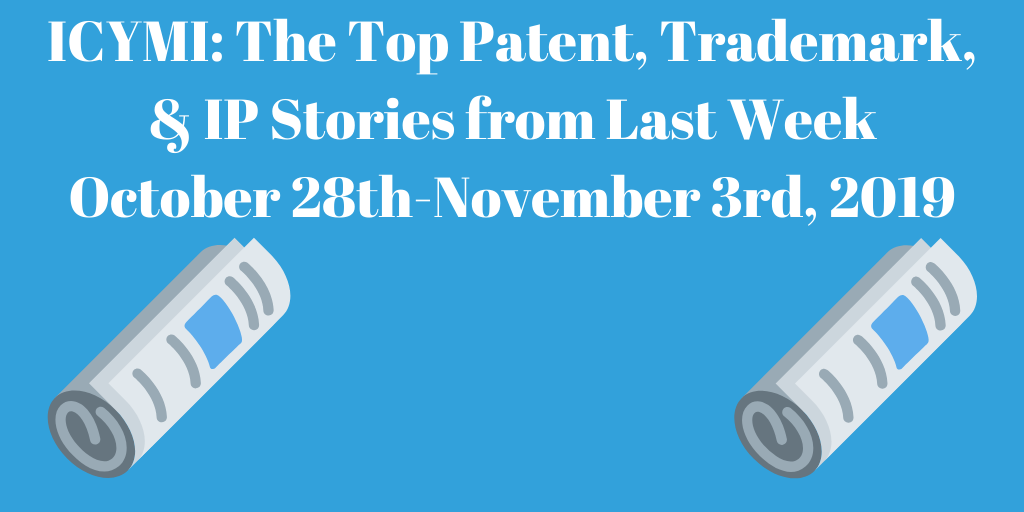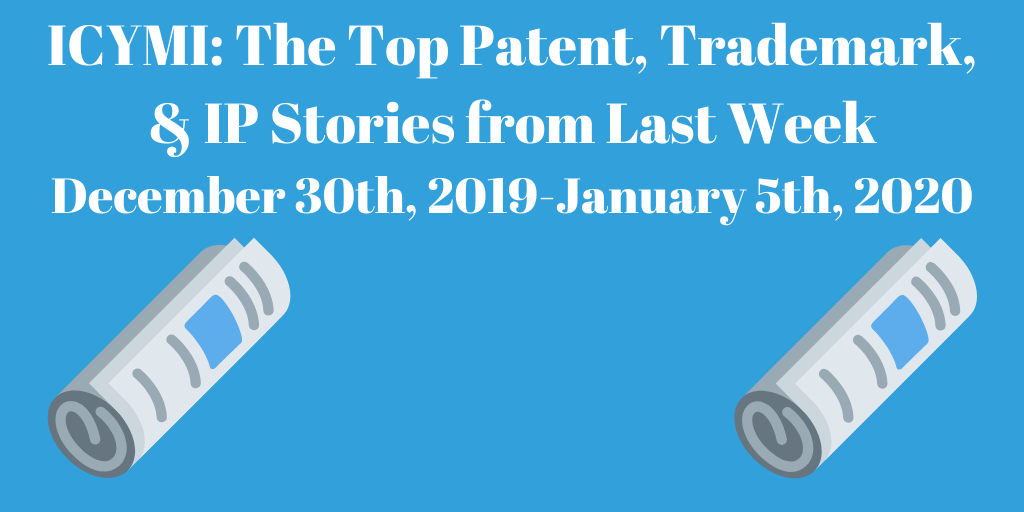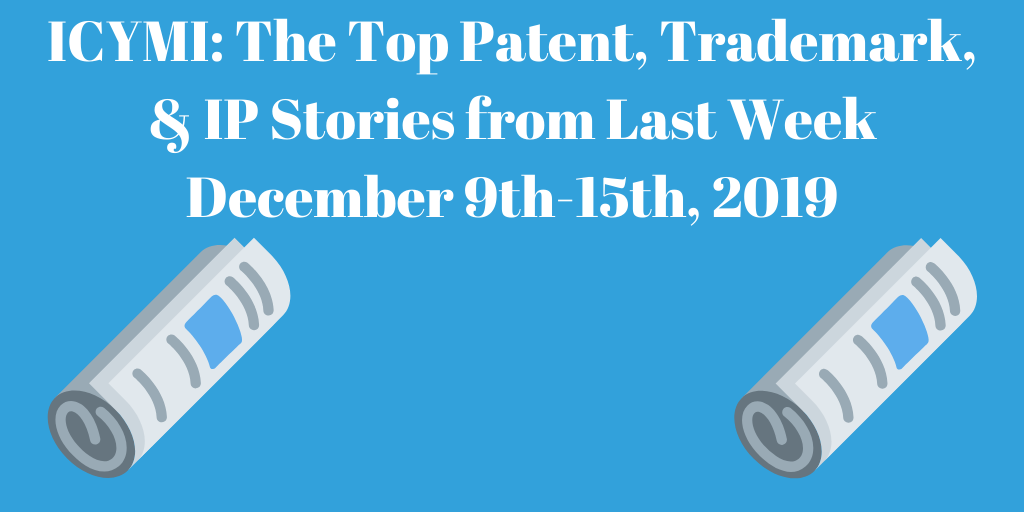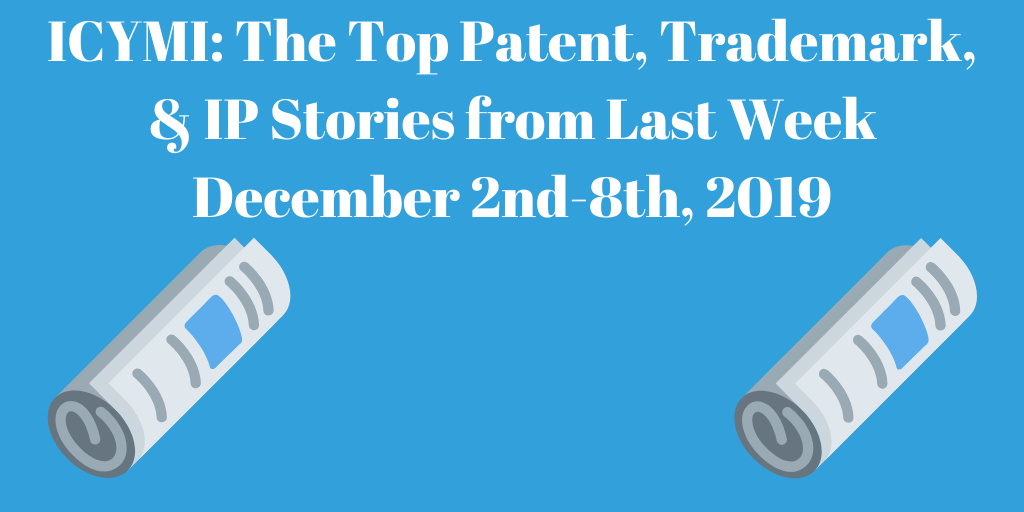Top Patent, Trademark, and IP Stories from Last Week (10/28-11/3/19)
Every week, we will be highlighting the top patent, copyright, trademark, intellectual property, etc. stories of the previous week in our “In Case You Missed It” segment. The list itself is in no particular order and includes a wide range of stories from the patent world that are informative, noteworthy, or just plain bizarre. The stories included encompass everything from Supreme Court cases to insights into growing industries. Please feel free to comment your thoughts on the stories or share an important one we missed!
“Patent Death Squad Judges Can Be Fired, U.S. Appeals Court Says”
The U.S. Federal Circuit Court of Appeals in Washington, D.C. ruled the board that determines the validity of patents, the Patent Trial and Appeal Board (PTAB), unconstitutional last week. The court believes this to be the case given judges on the board are not appointed by the president and confirmed by the Senate despite the power they yield and their inability to be fired without cause. In essence, the court argues they were unconstitutionally appointed.
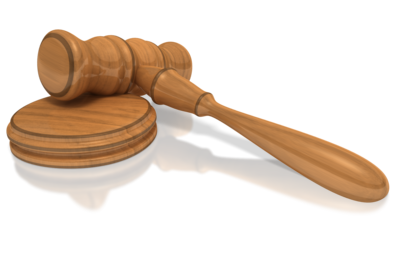
As a result, the court indicated the PTAB could be considered constitutional if judges were able to be fired by USPTO Director Andrei Iancu who is confirmed by the Senate. This would make the judges “inferior officers” and thus observe the Appointments Clause. It is worth noting that in 2018, the Supreme Court ruled the PTAB’s review process was constitutional and did not infringe a defendant’s right to a jury. To read more about this story, click here (via Bloomberg, October 30th, 2019).
“Study of Underrepresented Classes Chasing Engineering and Science Success (SUCCESS) Act of 2018”
The USPTO has released a report pursuant to the “Study of Underrepresented Classes Chasing Engineering and Science Success Act of 2018” (SUCCESS Act) that highlights the participation rates of women, minorities, and veterans in patent applications and grants over the past few decades. The report was provided to Congress on October 31st with recommendations on how to increase participation from the groups studied. Overall, the office concluded the groups studied were underrepresented as inventors and there is a need for additional data and information.
As we have reported in the past, female inventors are greatly underrepresented in the U.S. patent system (as well as abroad). There is improvement however. In 1976, the percentage of all inventors that were women stood at 3%. 40 years later, in 2016, that number increased to 12%. As for the percentage of patents with at least one female inventor named on it, that number increased from 4% in 1976 to 21% in 2016, a huge improvement. The increases are reflective of the increasing participation of women in STEM careers and selection to inventor teams by large corporations.
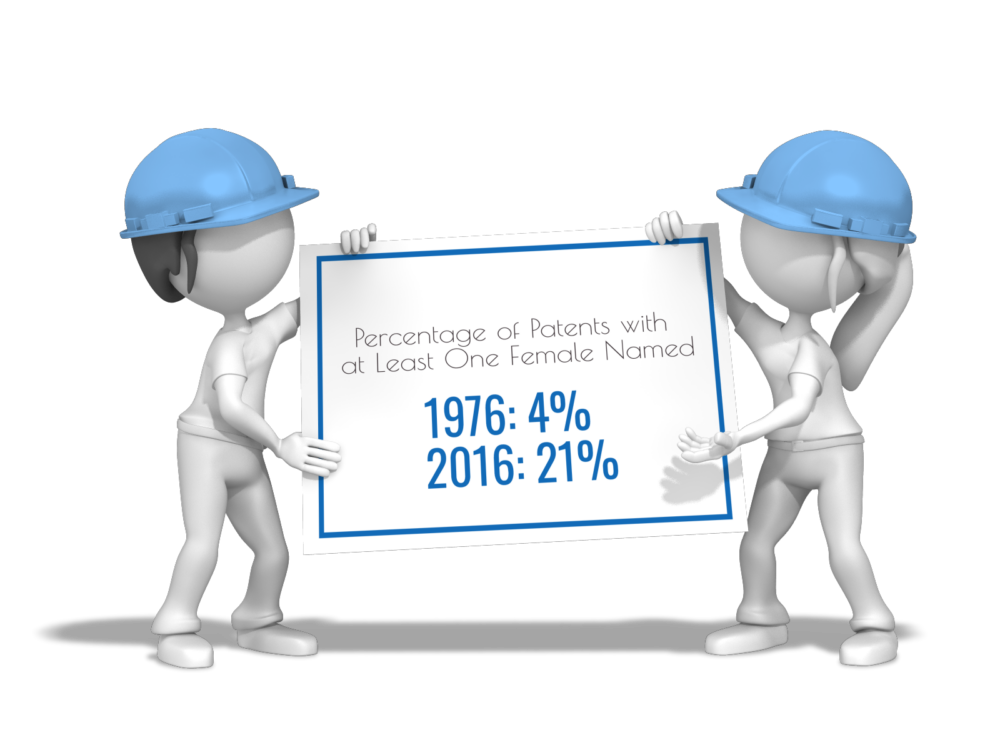
For African-Americans, the annual inventor rate was 1-7% between 1870-1940, relatively unchanged but increased towards the latter half of the time period. This increase is most notably attributed to the rise of HBCU’s (Historically Black Colleges and Universities). That said, necessary social capital was still stifled by segregation laws. Previous surveys indicate both African-Americans and Hispanics born in the U.S. are “significantly underrepresented among innovators.”
As for veteran participation, the USPTO found no studies on that subject. The USPTO recommends more studies given the lack of data on female, minority, and veteran inventorship. Other legislative recommendations the USPTO suggested to Congress is to give the USPTO more authority to gather information, increase sharing of information between federal agencies, expand grant programs, and highlight inventors and their contributions. To read more about this story, click here (via USPTO, October 31st, 2019).
“Copyright Case Against Taylor Swift Revived, at Least That’s What People Say”
Popstar Taylor Swift is at the center of a lawsuit by group 3LW again. The group alleged in 2017 that Swift copied lyrics for her 2014 hit “Shake It Off” from their 2001 song “Playas Gon’ Play.” Swift’s song includes the line “Cause the players gonna play, play, play, play, play / And the haters gonna hate, hate, hate, hate, hate” and 3LW’s song includes “Playas, they gonna play / And haters, they gonna hate.” The plaintiffs argue their use of “playas” and “haters” was unique in 2001 and Swift illegally copied it for use in her song 13 years later.
In 2018, a U.S. district court judge dismissed the suit, citing uses of “playas” and “haters” and their variations in songs prior to the 2001 hit. “By 2001, American popular culture was heavily steeped in the concepts of players, haters and player-haters … The concept of actors acting in accordance with their essential nature is not at all creative; it is banal. The alleged infringed lyrics are short phrases that lack the modicum of originality and creativity required for copyright protection,” Judge Michael Fitzgerald ruled last year.
The Ninth Circuit Court of Appeals reversed the dismissal last week, indicating the judge was too quick to dismiss and relied on personal judgement without proper considerations. In their decision, the judges cited Justice Holmes’ ruling in the 1903 case Bleistein v. Donaldson Lithographing Co. in which Holmes writes, “It would be a dangerous undertaking for persons trained only to the law to constitute themselves final judges of the worth of pictorial illustrations, outside of the narrowest and most obvious limits. At the one extreme some works of genius would be sure to miss appreciation. Their very novelty would make them repulsive until the public had learned the new language in which their author spoke.” To read more about this story, click here (via Quartz, October 29th, 2019).
“The NCAA Will Allow Athletes to Profit From Their Name, Image and Likeness in a Major Shift for the Organization”
In a surprising announcement last week, the NCAA indicated that its top governing board voted unanimously to “permit students participating in athletics the opportunity to benefit from the use of their name, image and likeness in a manner consistent with the collegiate model.” Although the details are still being sorted out, the move is a stark contrast from the organization’s previous position on the matter.
Current NCAA bylaws forbid the sale of items of “names, likenesses or pictures of multiple student-athletes” to strictly “the member institution at which the student-athletes are enrolled, the institution’s conference, and outlets controlled by the charitable, educational or nonprofit organization.” Names on jerseys, bobbleheads, and apparel featuring an individual’s name, likeness, or picture were never allowed however promotion of players for NCAA events and championships was allowed. The new measure would presumably change this and enable athletes to get paid for use of their name, image and likeness. To read more about this story, click here (via CNBC, October 29th, 2019).

